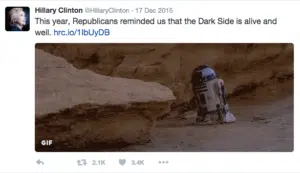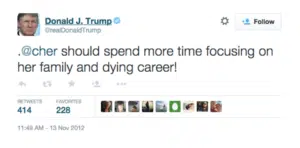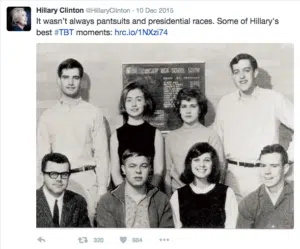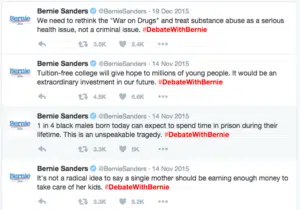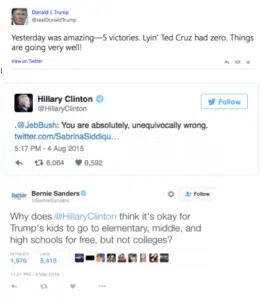This isn’t the first year that social media has played into politics. In 2008, President Barack Obama gained huge influence with his (and his campaign team of social media savvy millennials) ability to successfully bring political discourse into social media. His mere presence on social media had been unprecedented, earning him the title in later years as “The First Social Media President”.
Flash forward to 2016, and it is easy to see the influence that social media has had on both politics and the election. Policies, issues, debates and more all are live streamed on the Internet, available for everyone to see.
All candidates in this year’s election are aware of the importance of social media and the role it will play in targeting the generational vote they are after: millennials.
Participatory Politics is defined as “Interactive, peer-based acts through which individuals seek to exert influence on issues of public concern”. Data from the Participatory Politics Study by New Media and Youth Political Action suggests that 41% of young people ages 15-24 engage in participatory politics, most of which is in the social media realm. These people are much more likely to turn to the polls come November, and the candidates are reflecting this knowledge in their social media ad budgets and investments in social media campaigns.
Increase Social Spending
Presidential candidates, Republican and Democrat, are expected to spend a combined $6 Billion dollars on advertising in this election cycle, with and estimated $1 Billion going to digital advertising efforts alone. This vast ad budget does not even consider what outside groups are spending on social media to elect the candidate that best represents their interests, which often outspends the candidate’s efforts.
Opening Up Doors
Social media has opened up opportunities to candidates who have virtually no political experience as an elected official whatsoever, such as Donald Trump, Carly Fiorina, and Ben Carson. For example, Donald Trump has garnered wild success (and criticism), via his Twitter account with 8.5 Million Followers. In previous election cycles, he would have had to rely on the GOP to disseminate his message and garner support, but now candidates and presidential hopefuls can take spreading their message into their own hands- literally.
Social media also provides real-time data on what people are talking about at any given moment. Presidential hopefuls have been able to pick up on these fleeting trends to stay relevant among a younger audience and also position themselves as more relatable.
As the primaries come to a close soon, let’s take a look at how some of the top candidates have been utilizing Twitter throughout the cycle:
@HillaryClinton made several pop-culture references, such as this one capitalizing on all of the media attention on Star Wars.
@realDonaldTrump looked to take some jabs at fellow entertainers and politicians alike.
There was some #TBT action…
@BernieSanders opened up “town hall” style conversations during televised debates, allowing Twitter audiences to ask questions and be heard.
So, regardless of who you will be supporting when you head to the polls in November, there is no doubt that social media is playing some role in your final decision, if you are an active user. Whether you learned breaking news from a candidate on Twitter, loved a candidate’s Instagram feed, or had great appreciation for their strong Snapchat story, social media’s influence on political discourse is undeniable. However, can social media impact the actual results of the election? Let’s take a look.
Can Social Media Impact the Election?
There is no doubt that the majority of millennials live on social media, so it would make sense for all candidates to have a strong social media presence, right? With social media, we have instant access to polls, important campaign information, candidate viewpoints, etc. Before 2016, many millennials never found the interest to watch television to tune into candidates’ speeches and debates. However, this election season, many of us find ourselves more compelled to follow the candidates and get first hand access to their personal opinions and ideas.
But the real question is, can social media predict the outcome of a presidential election? Does the number of followers contribute to how successful a candidate is? For instance, Donald Trump, with over 8 million followers on Twitter, is known to instigate the masses and spark conversations among voters. The man tweets just about everything, and we can’t deny that his erratic thoughts and ability to say whatever comes to his mind is quite entertaining.
Jeb Bush, on the other hand, was not as active on his social media platforms and rarely spoke out against his competitors. The public has to find you overly interesting and hold you to a standard of whether or not you deserve to have the ‘Follow ‘button pressed for you. He was well behind the rest of his opponents when it came to enthusiasm, page likes, and followers. He later dropped out of the race. Coincidence? Maybe not.
For a candidate do well, they must ignite passion and conversation amongst every demographic. With an overwhelming amount of millennials in the US, candidates must think about who exactly they are campaigning to, and how to relate to them in a way that compels them to vote!
Twitter: The Battlefield
This election season, Twitter seems to be the battlefield for each side to fire shots at the other. Let’s take a look at some more ways the candidates used Twitter to make their way to the top.
Candidates need to form emotional connections to their audience, much like Hillary Clinton and her ability to speak out about injustices. Candidates’ hashtags also get conversations going, such as Bernie Sanders’ #FeeltheBern and Donald Trump’s #Trump2016. With each hashtag, users can get together and spark conversations and interests. They can even go a step further with movements such as #StopGunControl and #ClimateChange to discuss issues that are important to them.
Over the course of the campaign thus far, Trump and Clinton have the largest social media following and in turn, are leading the polls as well. Their time spent on social media has definitely increased their presence online and encouraged voters to raise funds and support them.
So, if it was up to social media, it looks like Trump would be our next president. At the end of the day, these candidates are all brands and it is how they represent their brand that will give them a competitive advantage amongst the rest. Even though it is not promised that a follow may lead to a vote, it is still an opportunity to leverage users and remain relevant.
One thing is for sure; if you’re not engaging with your audience on social media, you’re losing valuable impressions and voter retention.
